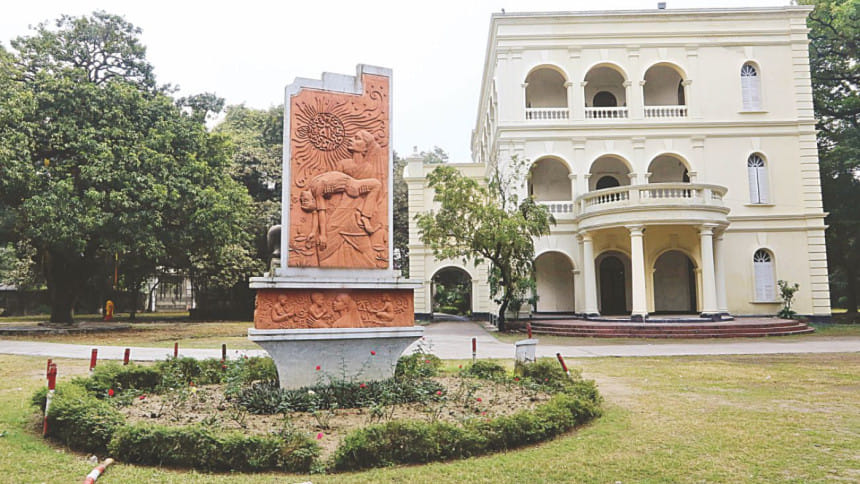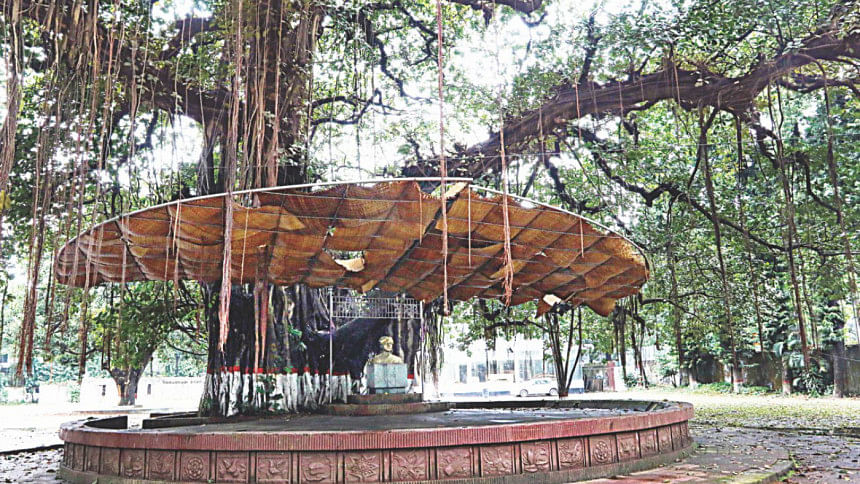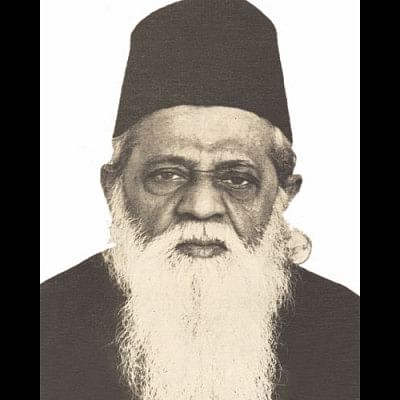Bangla Academy: Custodian of Bengali language for 62 years

Contrary to popular belief, the idea of establishing Bangla Academy predates the language movement. By many accounts, Bangla Academy was the brainchild of Dr Muhammad Shahidullah, the legendary Bengali linguistic. In 1948, at a literary conference held in Dhaka, he proposed to establish a body that would be devoted to researching Bengali language and literature and entrusted with the authority to standardise the rules of usage and grammar. He expanded on his ideas through opinion pieces in the Dainik Azadi, an influential voice in the then-East Pakistan. The paper also endorsed his ideas in an editorial.
By that time, the battle over what would be the state language of Pakistan was gradually gaining momentum, culminating in the demonstrations of February 21, 1952, when the police opened fire on protestors and nationwide outrage followed. It was a watershed moment in the history of East Pakistan, one that eventually led to its separation from West Pakistan 19 years later through a bloody war. The far-reaching incident ignited a populist Bengali nationalism that quickly began to prevail over the existing Muslim nationalism. The Awami Muslim League, which played a pivotal role in the language movement, became the Awami League, giving itself a more secular form. These two identities—Bengali and secular—would later be the guiding beacon in the Bengali's struggle for liberation.
The Awami League and three other political parties joined forces and defeated the Muslim League, which was seen as supporting the West Pakistani regime, in the ensuing elections of 1954. The issue of Bangla Academy had made it to the electoral manifesto of the alliance, the United Front, beforehand. It was a prominent pledge, more so in light of the fact that the first and foremost pledge in the United Front's election manifesto was to recognise Bengali as one of the state languages of Pakistan. With the memory of bloody February 21 still fresh, the manifesto struck a chord. In fact, when the United Front fulfilled the pledge by turning Burdwan House, the official residence of East Pakistan's chief minister, into an institution for research on Bengali language and literature—that is to say, Bangla Academy—many hailed it as one of the alliance's landmark accomplishments during its very brief tenure in power.
In that sense, the establishment of Bangla Academy in 1955 was a solid reflection of the fact that Bengali identity was taking root in a country that had come into existence on the basis of Muslim exclusiveness. The institution's very inception was integral to a wind of transition that eventually realised our wider aspiration to become an independent nation.

In the more than 60 years since, the academy has commissioned numerous studies and major translations, formulated the rules of language usage, published books and organised literary and folklore conferences across the country. According to one account, Bangla Academy has published more than five thousand books till date. Many of the books published under its auspices are the ones that frequently make it to the bookshelves of those who value Bengali literature.
The first major accomplishment of the academy, according to Professor Shamsuzzaman Khan, its Director General, was Ancholik Bhashar Obhidhan (Dictionary of Local Bengali Dialects), first published in 1965. The contents of the dictionary—a phenomenal work by every means—was collected and edited by the academy's visionary Dr Shahidullah himself. In his lifetime, the acclaimed linguistic saw one volume of the dictionary published by the academy.
Indeed, dictionaries have had a special place in the academy's work in the academic arena. It has produced quite a number of them. Bangla Academy claims that after 110 years of efforts to formulate a standard Bengali dictionary, it was the academy that finally came up with a Standard Bengali Dictionary in 2011. The Evolutionary Dictionary of Bengali language is another of its major works, consisting of three volumes, each consisting of about a thousand pages.

Another area of special emphasis for the academy is folklore. This is also an area of expertise of Professor Shamsuzzaman—for which he won the Independence Award this year. Since the late seventies, the academy has published hundreds of books—mostly collections or compilations—on the folk cultures and tales of the 64 districts of the country.
Bangla Academy has also undertaken some major translation works. In its early days, the academy commissioned the translation of a wide range of books, from Chikitsha Bigyan to Thus Spake Zarathustra by Frederick Nietzsche. In 1978, Bangla Academy translated Siyar-ul-Mutakherin from Persian. "If this book had not been written, a big part of our history would have remained in dark," opined Professor Shamsuzzaman in an interview last year.
After Bangladesh came into being, in 1972, Bangla Academy started its work with renewed vigour. Its Director General, Dr Mazharul Islam, brought in dozens of poets, writers, artists and intellectuals to work with the academy. These included some of the brightest literary minds of the day like Asad Chowdhury, Rafiq Azad and Rashid Haider. Two years later, the academy went on to organise an international literature conference, attended by a number of writers, poets and intellectuals from India, the Soviet Union and five other European countries.
In 1960, Bangla Academy introduced its annual literary awards, which have gone on to become the country's most prestigious one. The very first awardees included legendary literary figures like Farrukh Ahmad, Abul Mansur Ahmed, Abul Hashem Khan and Khan Muhammad Mainuddin. Over the years, the academy introduced a few other awards such as the Rabindra Award, Syed Waliullah Award, Sadat Ali Akhand Shahitya Purashkar, named after prominent Bengali litterateurs.
Bangla Academy also played an important role behind UNESCO's inclusion of the Traditional Art of Jamdani Weaving and Mangal Shobha Yatra of Pahela Baishakh in its Representative List of Intangible Cultural Heritage of Humanity.
Of all its achievements, the most extraordinary, and close to people's heart, is that it has successfully organised the Amar Ekushey Boi Mela (Ekushey Book Fair) every year since 1978. The book fair, dedicated to the martyrs of the language movement, is a month-long affair and arguably the lifeline of the book publication industry. This year, books worth Tk 65 crore were sold. Bangla Academy takes enormous pride in organising this largest literary festival of the country even in most trying circumstances.
The last two fairs, for example, took place amid tight security, as there was widespread fear of terrorist attacks. The year before that, writer and blogger Avijit Roy was hacked to death by militants while leaving the fair premises. Later, one of his publishers, Faisal Arefin Dipan, was hacked to death.
At the time, the academy was also criticised by some quarters of the society for failing to express enough support for imperilled writers and publishers. In 2016 it had shut down the stalls of Ba-Dwip Prakashan, a publication house, and banned it for selling a book that "hurt religious sentiments." Police even arrested the author of the book and the owner of the publication house. These, and its banning of another publication house allegedly because its owner criticised Bangla Academy's treatment of Ba-Dwip Prokashan, thus going against the "greater interest of the fair" triggered concerns of the academy's commitment to freedom of speech. The episode led many to complain that the academy had surrendered to the will of extremist forces.
Among the academy's failures, one can easily point out, is that it has not been able to cope up with the digital era. Despite rapidly deepening internet and smartphone penetration, the academy's presence can hardly be felt in cyberspace. It remains to be seen how the academy would promote Bengali literature, culture and heritage in the digital age.
But whatever shortcomings it may be criticised for, without a doubt, Bangla Academy has emerged as the most important institution for the research, preservation and promotion of Bengali language and culture. In recognition of its years of undisputed service to the Bengali language, the government awarded the academy the Independence Award in 2010. On December 3 this year, the academy celebrated its 62nd founding anniversary.
Nazmul Ahasan is a member of editorial team, The Daily Star.





Comments